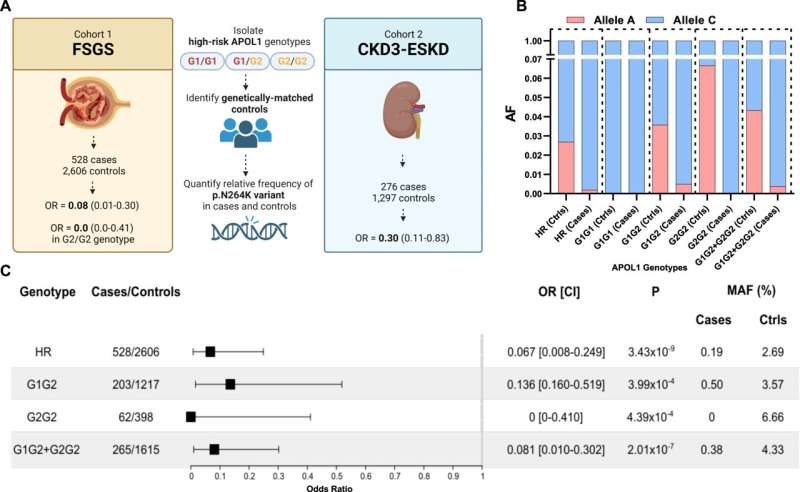This article has been reviewed according to Science X's editorial process and policies. Editors have highlighted the following attributes while ensuring the content's credibility:
fact-checked
peer-reviewed publication
trusted source
proofread
Genetic safeguard protects some who are considered high risk for kidney disease

Many Black Americans who are thought to have a high risk of developing kidney disease possess a protective genetic variant that nullifies the extra risk, a new study from Columbia researchers has found. The work is published in the journal Nature Communications.
The study found that high-risk people who carry this variant have a risk of developing kidney disease much closer to that of the general population.
The findings will have an immediate impact on clinical practice, says study leader Simone Sanna-Cherchi, MD, associate professor of medicine at Columbia's Vagelos College of Physicians and Surgeons.
"Physicians will need to take a closer look at their patients and determine if they should be reclassified based on this finding," he says. "And if their reclassified patients do have kidney disease, they'll need to look for another cause that explains their kidney problems."
Based on the people included in the study, Sanna-Cherchi says between 4% and 10% of patients could be reclassified, although more studies are needed to make more precise estimates.
Risk reversal
Black Americans develop kidney disease at a rate five times higher than Americans with predominantly European ancestry.
Much of the increased risk comes from two variants in the APOL1 gene, G1 and G2, that are more common among Africans and people of African ancestry. The risk for kidney disease, especially focal segmental glomerulosclerosis (FSGS) that can lead to kidney failure, manifests in individuals carrying two of these variants at the same time (i.e. two G1, one G1 and one G2, or two G2).
About 13% of Black Americans carry one of these high-risk APOL1 combinations, which create proteins that tend to damage kidney cells.
But only a fraction of high-risk APOL1 carriers eventually develop kidney disease, suggesting that many people carry other genetic modifiers that affect the risk.
The new study shows that one such modifier is hidden within the APOL1 gene itself. The researchers found that people who carry a high-risk APOL1 genotype containing the G2 variant (i.e. G1/G2 or G2/2) that also contains a second variant called N264K have much lower risk of developing kidney disease.
"Individuals with both of these variants have about one-eighth the risk of kidney disease than those with just APOL1 G2, virtually reducing the risk for FSGS to that of individuals without the APOL1 high-risk genotypes," Sanna-Cherchi says.
The finding is consistent with previous research from Sanna-Cherchi's collaborators, who found that the N264K variant protects kidney cells grown in the laboratory from overactive APOL1 proteins created by the high-risk variants.
Implications for kidney transplant, new drugs
Because people who carry G1 and G2 variants have such a high risk of developing kidney disease, kidney donations from such individuals are often discouraged, because on one hand, an APOL1 high-risk donor would have a high risk of kidney failure after kidney donation and, on the other hand, the recipient of a high-risk kidney would have a shorter graft survival.
"This finding could expand the pool of potential kidney donors," Sanna-Cherchi says. "Now we can move APOL1 high-risk G2 carriers to the low-risk donor category if they also test positive for N264K."
The presence of N264K also has major implications for APOL1-specific drugs that are currently in development. The new finding adds to evidence that suggests reducing the activity of APOL1 would be an effective way to prevent or treat APOL1-mediated kidney disease.
Taking N264K into account also will be critical in testing new APOL1 drugs.
"Individuals with N264K should not be included in the intervention arm of these clinical trials, since these people do not have overactive APOL1 proteins or a high risk of APOL1-related kidney disease," Sanna-Cherchi says. "Our findings should allow for a more accurate study design."
Next steps
Other hidden modifiers probably exist that reduce or enhance the risk of developing kidney disease among APOL1 high-risk carriers, Sanna-Cherchi says.
Because N264K is never found in individuals with the G1/G1 genotype, genetic modifiers specific to G1 may exist and could be found with genotype-specific APOL1 studies that require larger sample sizes.
More information: Yask Gupta et al, Strong protective effect of the APOL1 p.N264K variant against G2-associated focal segmental glomerulosclerosis and kidney disease, Nature Communications (2023). DOI: 10.1038/s41467-023-43020-9





















